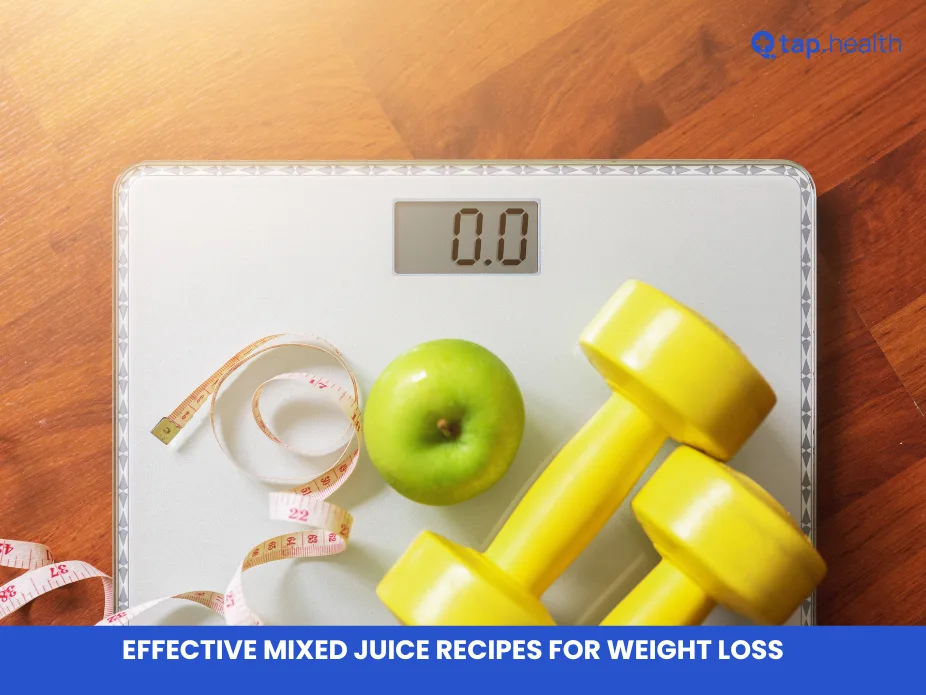Embarking on a weight loss journey often involves making mindful dietary choices, and incorporating mixed juices can be a delicious and effective strategy. Mixed juices not only provide essential nutrients but also help in detoxifying the body, boosting metabolism, and keeping you satiated. This comprehensive guide explores effective mixed juice recipes tailored for weight loss, supported by real-life scenarios, expert insights, and proven research.
Nutrient-Packed Ingredients for Weight Loss Juices
Low-Calorie Vegetables
Cucumber
Cucumbers are low in calories and high in water content, making them ideal for weight loss juices. They help keep you hydrated and provide a refreshing base for your juice blends.
Spinach
Spinach is a powerhouse of nutrients, rich in iron, calcium, and vitamins A, C, and K. Its low-calorie profile makes it perfect for weight loss, while its fiber content aids in digestion.
Metabolism-Boosting Fruits
Green Apples
Green apples are lower in sugar compared to their red counterparts and are rich in fiber, which helps in feeling full longer and aids in digestion.
Grapefruit
Grapefruit is known for its metabolism-boosting properties. It contains compounds that may help in reducing insulin levels and promoting fat burning.
Superfoods for Enhanced Benefits
Ginger
Ginger has thermogenic properties that help in boosting metabolism and burning calories. It also aids in digestion and reduces inflammation.
Lemon
Lemon juice is a natural detoxifier and helps in flushing out toxins from the body. It also enhances the flavor of juices without adding extra calories.
Hydrating Ingredients
Coconut Water
Coconut water is an excellent source of electrolytes, helping to keep you hydrated. It adds a subtle sweetness to juices without excessive sugars.
Celery
Celery is low in calories and high in water content. It acts as a natural diuretic, helping to reduce water retention and bloating.
Real-Life Scenarios
Successful Weight Loss Journey
Anna’s Transformation:
Anna, a 32-year-old marketing manager, struggled with weight management due to a hectic schedule and irregular eating habits. She decided to incorporate mixed juices into her daily routine, replacing her morning breakfast with a nutrient-dense juice. Over six months, Anna lost 25 pounds by combining her juice regimen with regular exercise and mindful eating practices. The variety of ingredients in her juices kept her meals interesting and provided the necessary nutrients without excess calories.
Boosting Energy Levels
Jake’s Enhanced Productivity:
Jake, a 28-year-old software developer, found his energy levels dipping mid-afternoon, leading to decreased productivity. By integrating a morning juice blend rich in spinach, green apples, and ginger, he experienced a sustained energy boost throughout the day. The natural sugars and nutrients in the juice provided the necessary fuel without the crash associated with sugary snacks.
Managing Cravings
Lily’s Craving Control:
Lily, a 40-year-old teacher, often found herself reaching for unhealthy snacks in the evening. She started consuming a celery, cucumber, and lemon juice in the late afternoon, which helped curb her cravings. The high water content and fiber from the celery kept her feeling full, reducing her overall calorie intake and aiding in weight loss.
Expert Contributions
Nutritionist Insights
Dr. Emily Roberts, Registered Nutritionist:
“Mixed juices can be an effective tool for weight loss when used correctly. They provide essential nutrients without the high calorie content found in many processed foods. It’s important to balance juice intake with whole foods to ensure adequate fiber and protein consumption, which are crucial for maintaining muscle mass and overall health during weight loss.”
Dietitian Recommendations
Michael Lee, Certified Dietitian:
“When creating weight loss juices, focus on incorporating a variety of vegetables and low-sugar fruits. Ingredients like spinach, cucumber, and green apples are excellent choices. Additionally, adding superfoods like ginger and lemon can enhance the metabolic benefits of your juice, making it a more effective component of your weight loss strategy.”
Medical Perspectives
Dr. Laura Martinez, Physician:
“Juicing can support weight loss by providing a nutrient-dense option that helps reduce overall calorie intake. However, it’s important for individuals to monitor their sugar intake and ensure that juicing is part of a balanced diet. Consulting with a healthcare provider before making significant dietary changes is advisable, especially for those with underlying health conditions.”
Recommendations Grounded in Proven Research and Facts
Boosting Metabolism
Research published in the Journal of Nutrition indicates that ingredients like ginger and green tea can enhance metabolic rate, aiding in weight loss (source). Incorporating these into your juice can provide an additional metabolic boost.
Enhancing Satiety
A study in the International Journal of Obesity found that beverages with high water content, such as vegetable juices, can increase feelings of fullness and reduce overall calorie intake (source). This makes mixed juices an effective strategy for managing hunger and reducing snacking between meals.
Detoxification
According to research in Nutrients, detoxifying ingredients like lemon and cucumber help eliminate toxins from the body, improving overall metabolic function and supporting weight loss efforts (source). These ingredients enhance the cleansing process without adding excessive calories.
Blood Sugar Regulation
Green apples and celery have a low glycemic index, which helps in maintaining stable blood sugar levels. A study in the American Journal of Clinical Nutrition highlights the importance of low-GI foods in preventing insulin spikes and promoting fat burning (source). Including these in your juices can aid in weight management by controlling cravings and reducing fat storage.
Factual and Reliable Information
Understanding Caloric Intake
While juices can be a healthy addition to a weight loss diet, it’s important to be mindful of their caloric content. Opt for low-calorie vegetables and limit high-sugar fruits to keep the overall calorie count low. For example, a juice made primarily with spinach, cucumber, and green apple can provide essential nutrients without excessive calories.
Balancing Macronutrients
To ensure a balanced diet, it’s crucial to incorporate proteins and healthy fats alongside your juice intake. Adding a scoop of plant-based protein powder or a tablespoon of chia seeds to your juice can enhance its nutritional profile, providing sustained energy and supporting muscle maintenance during weight loss.
Avoiding Excessive Sugar
High sugar intake can lead to weight gain and other health issues. When making mixed juices, prioritize vegetables over fruits to keep sugar levels in check. For instance, using cucumber and celery as the base and adding a small amount of green apple or lemon for flavor can create a delicious and low-sugar juice.
Incorporating Fiber
Although juicing removes most of the fiber from fruits and vegetables, including some pulp in your juice can help retain dietary fiber, which is essential for digestive health and maintaining stable blood sugar levels. Using a blender instead of a juicer can help preserve more fiber in your juice blends.
Hydration and Weight Loss
Staying hydrated is a key component of weight loss. Mixed juices, with their high water content, contribute to your daily hydration needs, supporting metabolic processes and aiding in the breakdown of fat cells. Combining juice intake with adequate water consumption ensures optimal hydration and enhances weight loss efforts.
Choosing Organic Produce
Organic fruits and vegetables are free from harmful pesticides and chemicals, making them a healthier choice for juicing. Organic produce often contains higher levels of certain nutrients, enhancing the nutritional value of your juices and supporting overall health and weight loss.
Consistency and Routine
Incorporating mixed juices into your daily routine can help establish healthy eating habits. Consistency is key to seeing long-term weight loss results. Setting specific times for juice consumption, such as replacing one meal per day with a juice, can create a sustainable weight loss strategy.
Effective Mixed Juice Recipes for Weight Loss
1. Green Detox Juice
Ingredients:
- 1 cucumber
- 2 cups spinach
- 1 green apple
- 1 lemon
- 1-inch piece of ginger
- 1 cup coconut water
Instructions:
- Wash all ingredients thoroughly.
- Cut the cucumber, green apple, and lemon into manageable pieces.
- Add all ingredients to a blender with coconut water.
- Blend until smooth and enjoy immediately.
Benefits:
This juice is low in calories, high in fiber, and packed with vitamins and minerals. The cucumber and spinach provide hydration and essential nutrients, while ginger and lemon aid in digestion and detoxification.
2. Metabolism Booster Juice
Ingredients:
- 1 grapefruit
- 1 green apple
- 2 stalks celery
- 1-inch piece of turmeric
- 1 cup water
Instructions:
- Peel and segment the grapefruit.
- Chop the green apple and celery into pieces.
- Add all ingredients to a blender with water.
- Blend until smooth and serve chilled.
Benefits:
Grapefruit and green apple work together to boost metabolism and promote fat burning. Turmeric adds anti-inflammatory properties, enhancing overall health benefits.
3. Energy-Enhancing Juice
Ingredients:
- 2 carrots
- 1 orange
- 1 handful kale
- 1-inch piece of ginger
- 1 cup almond milk
Instructions:
- Wash and chop the carrots, orange, and kale.
- Add all ingredients to a blender with almond milk.
- Blend until smooth and enjoy immediately.
Benefits:
This juice provides a natural energy boost with vitamins A and C from carrots and orange. Kale adds iron and antioxidants, while ginger enhances metabolism and digestion.
4. Appetite Suppressant Juice
Ingredients:
- 1 green apple
- 1 cucumber
- 1 celery stalk
- 1 lemon
- 1 cup water
Instructions:
- Chop the green apple, cucumber, and celery.
- Add all ingredients to a blender with water.
- Blend until smooth and drink before meals to curb appetite.
Benefits:
High in fiber and water content, this juice helps you feel full longer, reducing overall calorie intake and preventing overeating.
5. Immune-Boosting Juice
Ingredients:
- 2 oranges
- 1 carrot
- 1-inch piece of ginger
- 1 teaspoon honey (optional)
- 1 cup water
Instructions:
- Peel and segment the oranges.
- Chop the carrot and ginger.
- Add all ingredients to a blender with water.
- Blend until smooth and sweeten with honey if desired.
Benefits:
Rich in vitamin C and antioxidants, this juice strengthens the immune system and supports overall health during weight loss.
Factual and Reliable Information
Sugar Content Considerations
While mixed juices offer numerous health benefits, it’s crucial to monitor their natural sugar content. High-sugar fruits can lead to increased calorie intake and hinder weight loss efforts. Opt for low-sugar fruits like green apples and berries, and balance them with plenty of vegetables to keep the sugar levels in check.
Portion Control
Managing portion sizes is essential for weight loss. A typical serving size for a weight loss juice is 8 to 12 ounces per day. Consuming larger quantities can lead to excessive calorie and sugar intake, counteracting your weight loss goals.
Organic vs. Conventional Produce
Choosing organic produce for your juices minimizes exposure to pesticides and harmful chemicals. Organic fruits and vegetables often retain higher levels of nutrients, enhancing the health benefits of your juices. Additionally, supporting organic farming practices contributes to environmental sustainability.
Storage and Freshness
To maintain the nutritional integrity of your juices, consume them immediately after preparation. If you need to store them, use airtight containers and refrigerate for up to 24 hours. Using a cold-pressed juicer can help preserve more vitamins and enzymes compared to traditional juicing methods.
Incorporating Pulp for Extra Fiber
Including some pulp in your juices helps retain dietary fiber, which is essential for digestive health and maintaining stable blood sugar levels. Blending instead of juicing allows you to keep the fiber intact, providing additional health benefits without compromising taste.
Hydration and Weight Loss
Proper hydration supports metabolic processes and aids in the breakdown of fat cells. Mixed juices contribute to your daily hydration needs, but it’s important to complement them with adequate water intake throughout the day to ensure optimal hydration and support weight loss.
FAQs ON Effective Mixed Juice Recipes for Weight Loss
What are the best mixed juice ingredients for weight loss?
The best ingredients include low-calorie vegetables like cucumber and spinach, metabolism-boosting fruits like green apples and grapefruit, and superfoods such as ginger and lemon. These ingredients provide essential nutrients while keeping the calorie and sugar content low.
How often should I drink mixed juices for weight loss?
Consuming mixed juices 1-2 times per day is recommended for weight loss. This can be in place of one meal or as a supplement to your regular diet. It’s important to balance juice intake with whole foods to ensure comprehensive nutrition.
Can mixed juices help me lose weight without exercise?
While mixed juices can aid in weight loss by reducing calorie intake and providing essential nutrients, combining them with regular exercise enhances the effectiveness of your weight loss efforts. A balanced approach involving diet and physical activity yields the best results.
Are there any risks associated with drinking mixed juices for weight loss?
Potential risks include excessive sugar intake, nutrient imbalances, and lack of dietary fiber if juices are consumed in place of meals. It’s important to monitor portion sizes, choose low-sugar ingredients, and ensure a balanced diet to mitigate these risks.
Should I use a blender or a juicer for making weight loss juices?
Using a blender retains more fiber and nutrients compared to a juicer. Blended juices are thicker and more filling, which can help in managing hunger and supporting weight loss. However, if you prefer a smoother texture, a cold-pressed juicer is a better option than traditional juicers.
Can I replace meals with mixed juices for weight loss?
Replacing one meal per day with a mixed juice can be an effective strategy for weight loss. However, it’s important to ensure that the juice is nutrient-dense and balanced with proteins, healthy fats, and carbohydrates to maintain overall health and energy levels.
How can I make my weight loss juices more satisfying?
To make your juices more satisfying, include ingredients that provide a sense of fullness, such as cucumbers and celery. Adding sources of protein like plant-based protein powder or healthy fats like chia seeds can also enhance satiety and support muscle maintenance.
How long should I follow a juice-based weight loss plan?
A juice-based weight loss plan can be followed for a few weeks to kickstart your weight loss journey. For long-term weight management, it’s important to transition to a balanced diet that includes a variety of whole foods while incorporating juices as a supplementary component.
Conclusion
Incorporating mixed juices into your weight loss regimen can be a delicious and effective way to boost your nutrient intake, enhance metabolism, and manage hunger. By selecting the right combination of low-calorie vegetables, metabolism-boosting fruits, and superfoods, you can create powerful juice blends that support your weight loss goals. Real-life success stories, expert insights, and research-backed recommendations highlight the potential benefits of mixed juices in a balanced diet. Remember to practice portion control, choose organic produce, and balance juice intake with whole foods to maximize the benefits and achieve sustainable weight loss.




